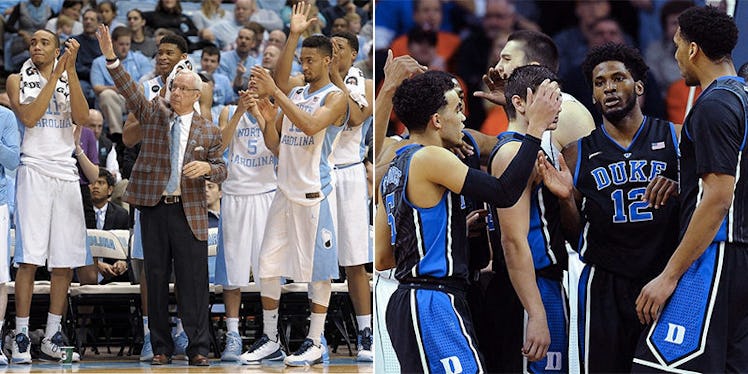
Money Madness: Why The NCAA Tournament Is Sports' Biggest Moneymaker
February is finally over. Snow is thawing; flowers are on the horizon, and March Madness is just around the corner.
Yes, the NCAA Men’s Division I Basketball Tournament is less than a month away. For the casual fan, this means three weeks of high-powered entertainment.
Buzzer-beaters and a couple thrilling upsets are sure to highlight the first few frenzied rounds, and when the dust settles, we’ll likely see familiar personalities, like Duke living legend Mike Krzyzewski, Louisville’s slick-haired Rick Pitino, or Kentucky’s loud and smarmy John Calipari leading one or more of the final four teams left standing.
A lot of world-class drama and human interest stories play out in the tournament each year, but there is something more cold and impersonal going on behind the scenes: the money.
This doesn't refer to the couple hundred dollars you stand to win if you conjure up the best bracket in your annual office pool; March Madness generates over a billion dollars every year.
“The NCAA Men’s Division I Basketball Tournament is] a purely commercial enterprise,” Michael Lewis, author of "Moneyball" and "The Blind Side," explained on PBS’s Frontline.
Indeed, pro ball has nothing on March Madness. The tournament makes more in ad revenue than the MLB playoffs, the NBA playoffs, the NFL playoffs and even the king of all spectacles, the Super Bowl.
Advertisers will continue to pay well into the six figures for a 30-second spot in the tournament, as long as it stays as popular as it is now (March Madness expected to draw about 200 million viewers total for its 64 games this year).
In 2010, the NCAA sold broadcasting rights to the tournament — for an absurd figure of $10.8 billion over 14 years — to CBS and Turner Sports (an extension of Time Warner that broadcasts the tournament on TNT, TBS and TruTV).
In the first year of the deal, CBS and Turner Sports fell just short of breaking even with $750 million in ad revenue.
Just a year later in 2012, ad revenue from the tournament jumped to $1 billion, so CBS and TruTV netted over $200 million. These profits show no signs of slowing.
In addition to the $771 million average, the NCAA will pull from CBS and Turner Sports until 2024. They also make about $40 million a year from ticket sales.
Most of that money goes back to the schools, but this is not an even split; conferences that performed best in the past six years (this figure is readjusted every year) net more money.
For example, the Big East, which features tournament regulars Georgetown, Villanova and Marquette, will take home about five times as much as the Mountain West, whose best members are the less-accomplished UNLV, BYU and San Diego State.
Host cities also get a piece of the pie. Diehard fans of successful teams in the tournament won’t mind traveling to Houston, Syracuse, Cleveland or Los Angeles (this year’s hosts for the regional semifinals and finals).
Those cities will see a huge surge in business across all sectors, from lodging to dining to entertainment that is not connected to the tournament.
Indianapolis, which hosts the national semifinals and the championship game, is expected to clear well over $100 million from visiting fans.
Many Americans don’t even care about basketball, but they love to watch and bet on the sport when the tournament rolls around.
The office bracket pool has become a tradition throughout the country that's so prevalent in our culture even the president won’t go a year without making his predictions. Those bracket contests are fun, but they're not where most of the gambling money is.
The tournament represents a smorgasbord of premium gambling events with each of the 64 games representing a shining new opportunity for a big win.
You can ameliorate your loss on one of the Houston quarterfinals in the same night if the underdog you picked in Los Angeles covers the spread.
But, it if you want to make some cash on the tournament, you might be better off taking bets, not making them. It’s easier than ever to start your own online bookie company; you can even get financing.
It doesn’t matter why you like the tournament. Maybe you’re looking to take in the whole scene as one thrilling narrative, or maybe, you will use the three weeks as a premium gambling buffet, caring not who wins or loses but if your team-of-the-hour can cover or beat the spread.
Either way, relax.
The NCAA and CBS have locked in their nine-digit paychecks; Vegas will come out ahead and the bettors will just about break even.
Oh yeah, and there should be some good basketball. Sit back and enjoy the Madness.